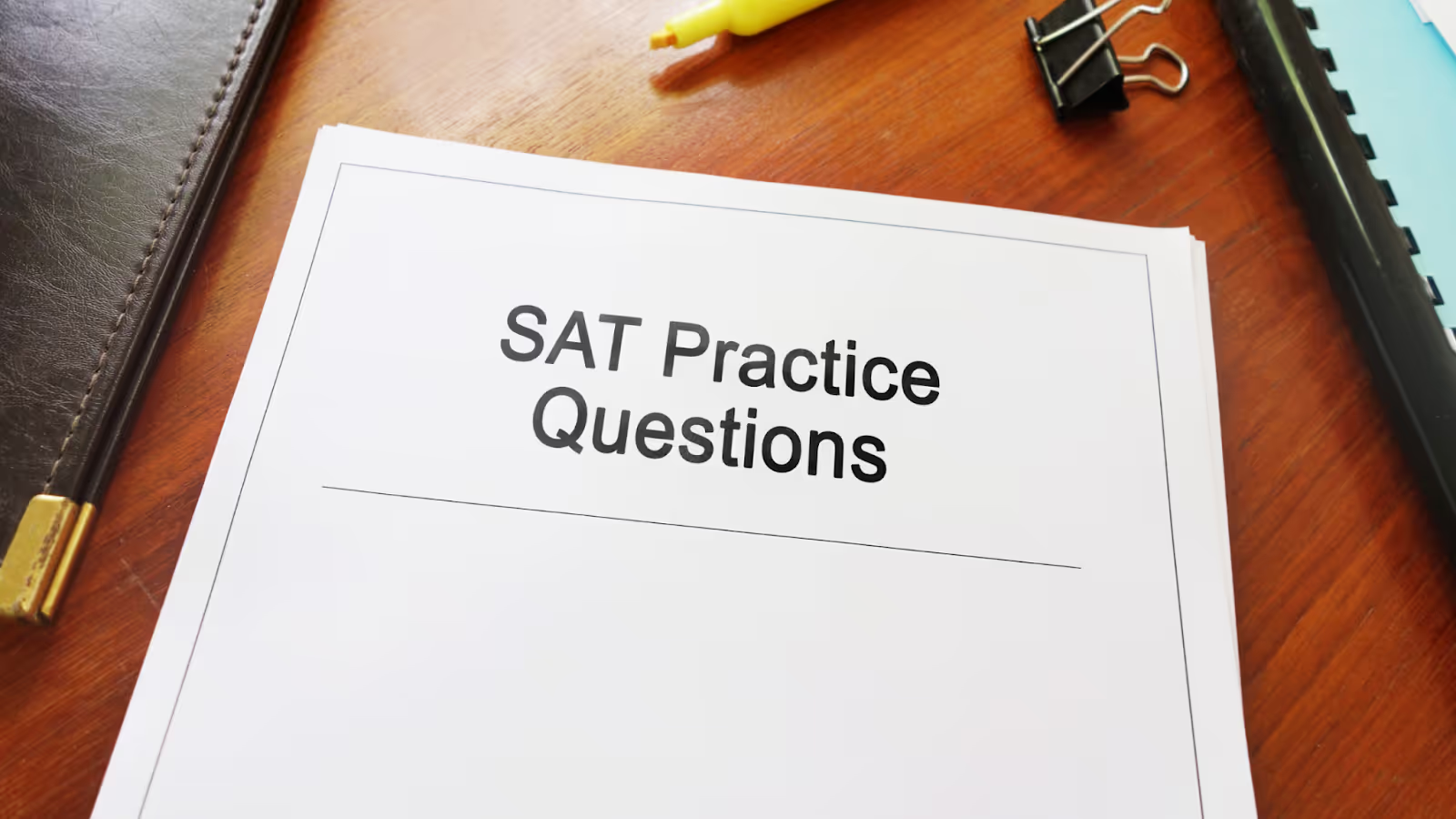6 Time Management Hacks to Boost Your SAT and ACT Scores
.avif)
When preparing for the SAT or ACT, most students focus on learning formulas, memorizing grammar rules, or practicing reading comprehension. While content mastery is essential, there’s one skill that often determines whether you reach your target score: time management. Both the SAT and ACT are timed tests with challenging pacing.
Even if you know the material, poor time management can cause you to run out of time, leave questions blank, or rush through the most complex problems.
The good news? Time management is a skill you can learn, practice, and master. Once you've mastered it, you'll feel a sense of relief and control, knowing that you can handle the test's time constraints.
In this blog, we’ll cover 6 time management hacks to boost your SAT and ACT scores, along with strategies, examples, and proven techniques to help you stay calm, confident, and efficient on test day.
Why Time Management Is Critical for the SAT and ACT
The SAT and ACT are not just about what you know; they’re about how quickly and effectively you can apply that knowledge. Here’s a quick look at the time constraints:
SAT
- Reading: 65 minutes, 52 questions (~75 seconds per question)
- Writing & Language: 35 minutes, 44 questions (~48 seconds per question)
- Math (No Calculator): 25 minutes, 20 questions (~75 seconds per question)
- Math (Calculator): 55 minutes, 38 questions (~87 seconds per question)
ACT
- English: 45 minutes, 75 questions (~36 seconds per question)
- Math: 60 minutes, 60 questions (1 minute per question)
- Reading: 35 minutes, 40 questions (~52 seconds per question)
- Science: 35 minutes, 40 questions (~52 seconds per question)
Without solid pacing strategies, you can lose valuable points simply because the clock runs out. Strong time management ensures that you maximize your performance, answer more questions correctly, and keep your stress levels in check.
It also helps you build confidence, since knowing you have a plan for pacing means less panic when the clock is ticking. You'll feel a sense of accomplishment as you see your strategic pacing paying off in your practice tests.
If you’re just getting started, the SAT Prep program at AP Guru breaks down both pacing and content into a structured plan, while also preparing you for specific question types like Main Idea Questions and Inference Questions.
Hack 1: Learn the Structure of the Test
What It Means
The first step in mastering time is knowing what you’re up against. You need to internalize the format, timing, and types of questions in each section.
Being familiar with how long each section lasts and what kinds of questions appear allows you to anticipate challenges and plan accordingly.
Why It Matters
When you know exactly how long you have per section and per question, you won’t waste time constantly checking the clock. Familiarity reduces anxiety and helps you anticipate transitions, like moving from easy to more complicated problems in the math section.
Test-day nerves decrease significantly when the exam feels like something you’ve practiced dozens of times.
How to Apply This Hack
- Memorize the number of questions and time limits for each section.
- Break down the average time you should spend per question.
- Create a pacing chart for practice tests (e.g., in SAT Reading, finish each passage in ~13 minutes).
- During practice, check the clock at natural checkpoints (after 10 or 20 questions) instead of after every single problem.
- Use official test guides to review the structure until you can recall it without looking.
For example, if you’re balancing whether to take the SAT or ACT, AP Guru has resources that compare testing options like UC vs CSU and Harvard vs MIT, helping you align time management prep with the schools you’re targeting.
Hack 2: Practice with a Timer Under Real Conditions
What It Means
Time management cannot be learned by studying content alone. You must simulate the actual test environment with realistic timing, strict rules, and minimal distractions.
Why It Matters
Practicing with a timer helps your brain become accustomed to the test's rhythm. Over time, you’ll know instinctively how long you’ve spent on a problem without constantly checking the clock. This builds test-day stamina and confidence.
It also helps you discover where you tend to lose time, whether it’s overanalyzing reading passages or double-checking every math answer.
How to Apply This Hack
- Always time yourself when practicing, even on small drills.
- Take full-length practice tests in a quiet room with no distractions.
- Use only the breaks provided in the real exam to simulate endurance.
- Track your results not only for accuracy but also for pacing.
- Review after each practice: note which sections you rushed and where you slowed down.
For structured, exam-like practice and analysis, check out AP Guru’s SAT Prep and ACT Prep programs.
Hack 3: Use the “Two-Pass Strategy”
What It Means
The two-pass strategy means you don’t get stuck on difficult questions the first time through. Instead, you answer everything you can quickly, then come back to the harder problems.
Why It Matters
Every question on the SAT and ACT is worth the same number of points. Spending five minutes on one challenging problem can cost you easy points from five simpler ones you never reach.
Using this strategy reduces test-day stress, ensures you secure all the points you can, and makes the test feel more manageable. The two-pass strategy gives you a sense of control over the test, reducing stress and making it feel more manageable.
How to Apply This Hack
- On your first pass, answer all the easy and medium-level questions quickly.
- Mark the tougher ones you’re unsure about.
- On your second pass, return to the marked questions with your leftover time.
- Stay disciplined: don’t let your pride force you to fight one problem for too long.
Hack 4: Develop Section-Specific Timing Techniques

What It Means
Each section has unique pacing challenges. A one-size-fits-all approach doesn’t work. You need tailored strategies based on the section and the test you’re taking.
Why It Matters
Understanding the quirks of each section allows you to maximize efficiency. For instance, the ACT English section demands speed, while the SAT Math section allows slightly more time per question.
Knowing these nuances ensures you use your strengths to compensate for weaknesses.
How to Apply This Hack
- Reading (SAT/ACT): Skim passages (2–3 minutes) and spend most of your time on questions. Don’t over-annotate. Practice scanning for main ideas and keywords.
- Writing & English: Trust your instincts on grammar; move quickly through mechanics questions. Remember that shorter answers are often correct.
- Math: Use shortcuts like plugging in numbers or back-solving instead of lengthy calculations. Skip questions that require long steps initially.
- ACT Science: Focus on charts and graphs first, then reasoning questions. Learn to ignore extra information and zero in on what’s being asked.
Developing customized techniques ensures you don’t waste time. This approach pairs well with deep prep in advanced coursework like AP Classes or blogs such as A-Level Math vs AP Calculus that help students understand their math strengths for test sections.
Hack 5: Guess Strategically and Never Leave Blanks
What It Means
On both the SAT and ACT, there is no penalty for wrong answers. That means leaving a question blank is the only guaranteed way to lose points. Smart guessing is a powerful way to grab extra points.
Why It Matters
Strategic guessing can add valuable points to your score, mainly when you’ve run out of time or are stuck between two answer choices. Even improving your guessing accuracy slightly can raise your score by dozens of points.
How to Apply This Hack
- Eliminate obviously wrong choices to increase your odds.
- If totally out of time, pick one consistent letter (like “C”) for all remaining answers.
- Train yourself to make quick decisions rather than agonize over one problem.
- Remind yourself that a guess gives you at least a 20–25% chance of being right, while skipping guarantees zero.
Hack 6: Build Stamina and Focus Through Practice

What It Means
The SAT lasts about 3 hours, and the ACT is even longer with breaks. Without practice, mental fatigue sets in, leading to careless mistakes. Building stamina ensures you perform as strongly on the last question as you did on the first.
Why It Matters
Strong stamina means you maintain focus through the final section as well as the first. Many students start strong but fade by the last math or science passage.
Stamina training prepares you not just for the content but for the mental endurance needed to perform under time pressure.
How to Apply This Hack
- Take weekly full-length practice tests to simulate endurance.
- Develop healthy pre-test habits: proper sleep, balanced meals, and hydration.
- Use mindfulness or short breathing exercises to reset between sections.
- Practice concentration with smaller timed drills to extend your attention span.
- Train like an athlete: treat each test as a performance that requires preparation and recovery.
You can also supplement academics with AP courses to build rigorous study habits year-round; explore AP Guru’s AP Programs.
How to Combine These Hacks Into a Winning Strategy
Each of these hacks is powerful on its own, but their real strength comes when combined into a personalized strategy:
- Learn the structure of the test until it feels second nature.
- Practice under timed, realistic conditions.
- Use the two-pass strategy to avoid time traps.
- Tailor your pacing to each section’s unique demands.
- Guess strategically and avoid blanks.
- Build stamina with full-length practice tests.
By weaving these strategies together, you’ll not only boost your speed but also reduce test-day anxiety. The more automatic these habits become, the more energy you’ll have to focus on problem-solving instead of clock-watching.
Common Time Management Mistakes to Avoid
Even with preparation, students often fall into traps such as:
- Over-annotating passages: Spending too much time taking notes in Reading.
- Overthinking easy questions: Doubting yourself on straightforward grammar or math problems.
- Ignoring the clock: Forgetting pacing checkpoints until it’s too late.
- Panic under pressure: Wasting time stressing about one challenging problem.
- Cramming only content: Neglecting timed practice until it’s too late.
Recognizing these pitfalls and planning to avoid them is just as important as learning new strategies. For more checklists and drills, browse the AP Guru Blog.

Final Thoughts
Time management is not an optional skill; it is the foundation of success on the SAT and ACT. By applying these 6 time management hacks, you’ll maximize your score potential and walk into test day with confidence.
To recap, the hacks are:
- Learn the Structure of the Test
- Practice with a Timer Under Real Conditions
- Use the Two-Pass Strategy
- Develop Section-Specific Timing Techniques
- Guess Strategically and Never Leave Blanks
- Build Stamina and Focus Through Practice
With consistency and practice, these strategies will help you boost your SAT or ACT score. If you want expert guidance, AP Guru offers one-on-one prep programs designed to build both content mastery and pacing skills, giving students the best chance to reach their dream scores.


